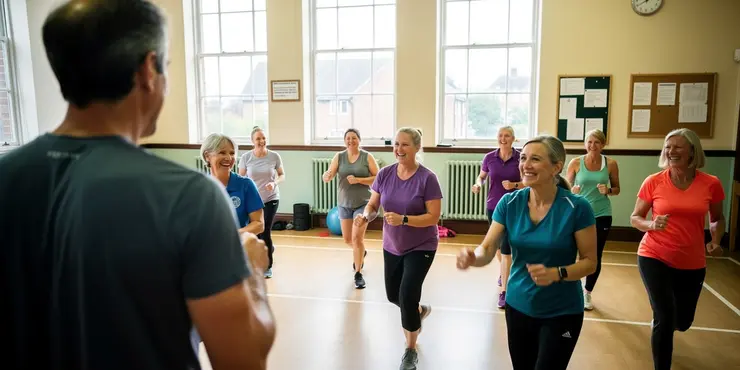
Find Help
More Items From Ergsy search
-
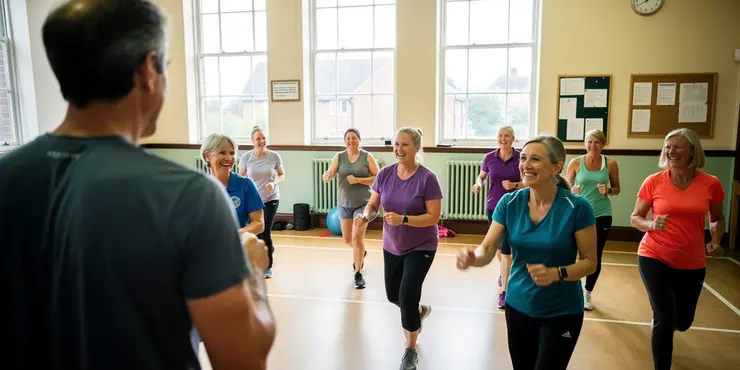
Can exercise influence cortisol levels?
Relevance: 100%
-

Can cortisol levels be measured?
Relevance: 79%
-

What factors can influence cortisol levels?
Relevance: 79%
-
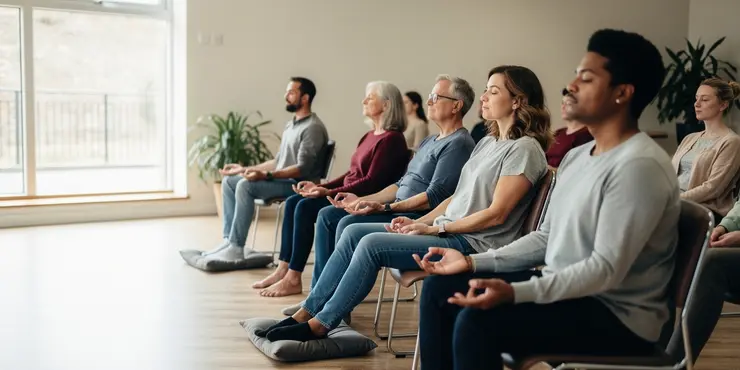
How can stress management affect cortisol levels?
Relevance: 77%
-

Are there any lifestyle changes that can help regulate cortisol levels?
Relevance: 76%
-

Can diet influence cortisol levels?
Relevance: 75%
-

What can low levels of cortisol cause?
Relevance: 74%
-

What can high levels of cortisol cause?
Relevance: 73%
-
Can cortisol levels impact mood and mental health?
Relevance: 72%
-

How do cortisol levels differ between acute and chronic stress?
Relevance: 71%
-

What is cortisol?
Relevance: 69%
-

How is cortisol regulated in the body?
Relevance: 61%
-

What is the role of cortisol in metabolism?
Relevance: 61%
-

What role does cortisol play in the body?
Relevance: 60%
-

Is there a connection between cortisol and the immune system?
Relevance: 59%
-

What is the relationship between cortisol and the circadian rhythm?
Relevance: 57%
-

How does cortisol affect the body's stress response?
Relevance: 56%
-
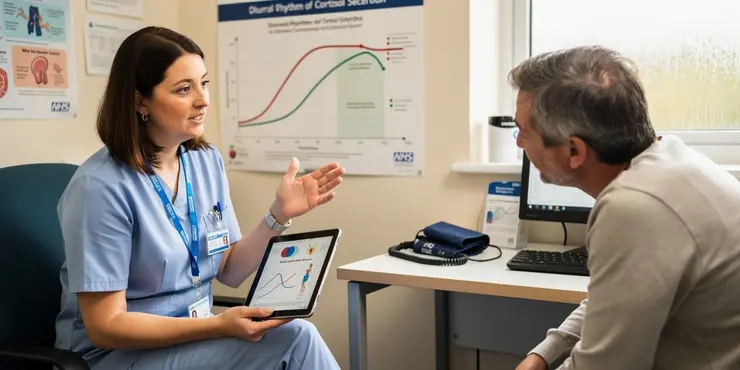
What is the normal pattern of cortisol secretion throughout the day?
Relevance: 56%
-
Can mixed exercises improve mental health?
Relevance: 32%
-
What are mixed exercises?
Relevance: 32%
-

Neck Exercises
Relevance: 31%
-
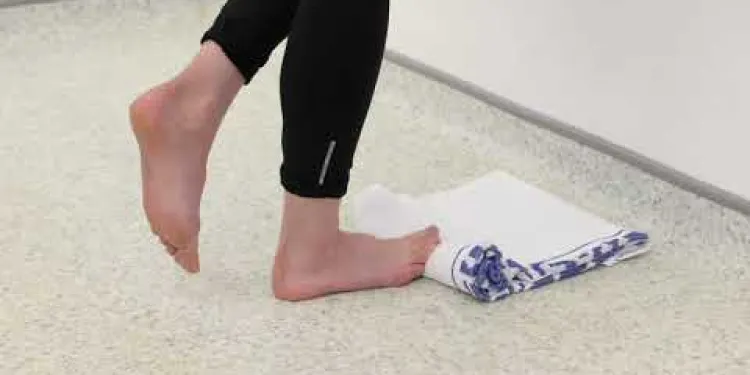
Plantar Fascia Loading Exercise (High Load Exercise)
Relevance: 31%
-
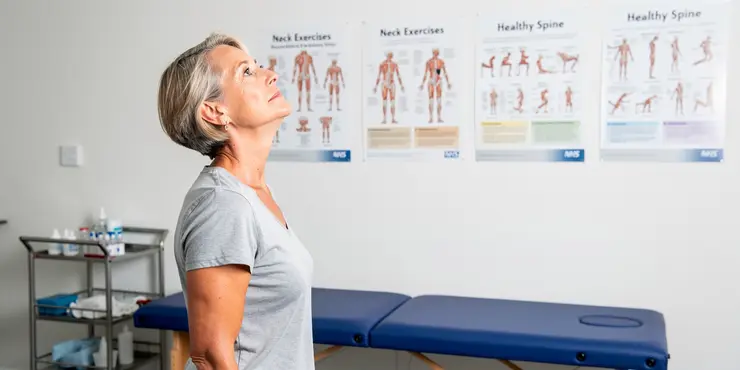
Neck Care Exercises
Relevance: 31%
-

Will I be able to engage in physical exercise?
Relevance: 30%
-
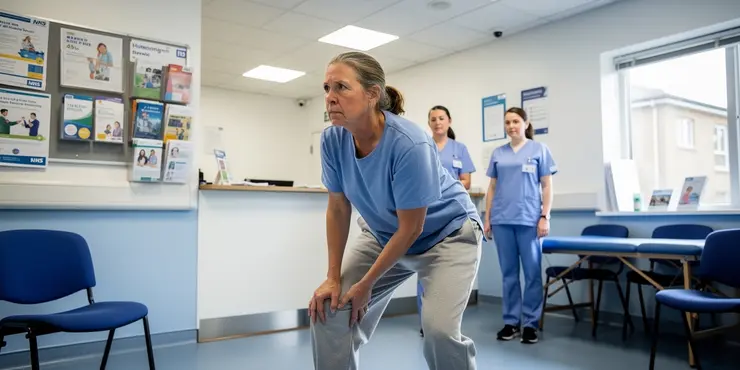
Does physical exercise help people with CFS?
Relevance: 30%
-
Can mixed exercises be done at home?
Relevance: 30%
-
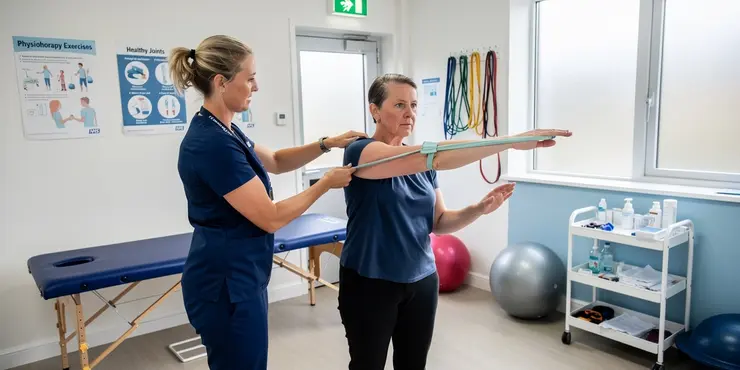
Shoulder Exercises 1
Relevance: 30%
-

Can GLP-1 levels be measured?
Relevance: 30%
-
Are mixed exercises beneficial for weight loss?
Relevance: 30%
-
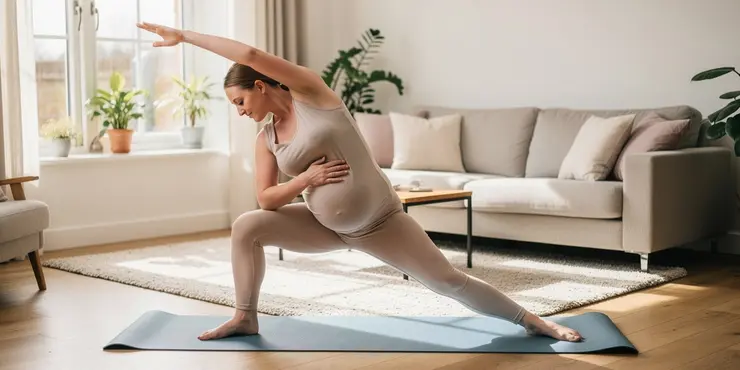
How does exercise benefit pregnancy?
Relevance: 30%
-

How often should I check my blood glucose levels?
Relevance: 30%
-

Neck Exercises
Relevance: 29%
-
Can mixed exercises help in muscle toning?
Relevance: 29%
-
Do mixed exercises build endurance?
Relevance: 29%
-

Diabetes: How to check your blood glucose level | NHS
Relevance: 29%
-
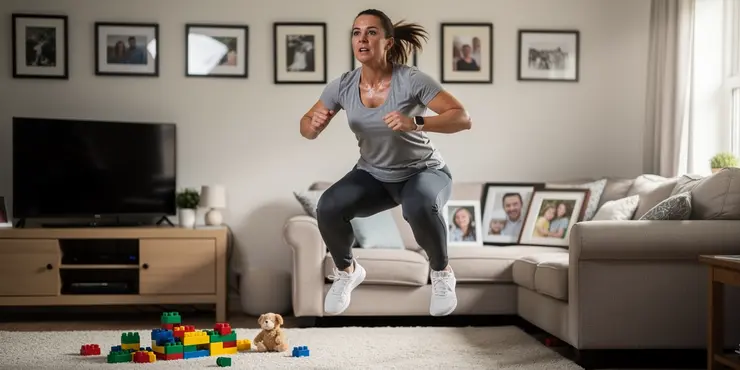
Exercise Routines for Busy Parents
Relevance: 29%
-
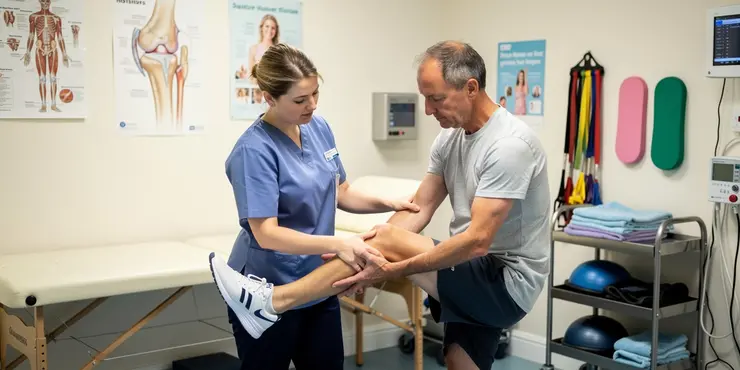
ACL exercises post-operation
Relevance: 29%
-
Why are mixed exercises better ?
Relevance: 29%
-

What are PSA levels? - Prostate Cancer
Relevance: 29%
-
How often should I do mixed exercises?
Relevance: 29%
Understanding Cortisol
Cortisol is a hormone produced by the adrenal glands, which are located on top of each kidney. Often referred to as the "stress hormone," cortisol plays a crucial role in helping the body manage stress. Additionally, it influences various bodily functions including metabolism, immune response, and blood pressure regulation. While cortisol is vital for overall health, consistently high levels can have negative effects, including weight gain, anxiety, and disrupted sleep patterns.
The Impact of Exercise on Cortisol Levels
Exercise is well-known for its wide array of health benefits, from improving cardiovascular health to boosting mental well-being. However, its relationship with cortisol levels is complex. Physical activity causes a temporary increase in cortisol levels as the body's response to the stress of exercise. This is a normal and healthy reaction, helping the body mobilise energy reserves and increase alertness.
Interestingly, the duration and intensity of exercise can significantly affect cortisol responses. High-intensity and prolonged workouts tend to spike cortisol levels higher than moderate-intensity sessions. However, this elevated level is typically short-lived, with levels returning to baseline following the workout.
Long-term Effects of Regular Exercise
Engaging in regular physical activity can lead to longer-term adaptations in how the body responds to stress, potentially moderating overall cortisol levels. Regular exercisers may experience reduced cortisol output in response to stressors outside of exercise. This is thought to be due to the body's improved efficiency in managing stress, leading to better overall hormonal balance.
Moreover, exercise can enhance mood and aid in stress reduction through the release of endorphins, often dubbed the body's "feel-good" hormones. Hence, the long-term benefits of a consistent exercise regimen may include not only a more optimal cortisol profile but also improvements in overall mental health.
Cortisol, Exercise, and Sleep
Another noteworthy effect of exercise on cortisol is its impact on sleep. Regular physical activity can improve sleep quality, which is essential for maintaining healthy cortisol levels. Quality sleep helps regulate hormone production, including cortisol, thereby supporting recovery and stress management.
However, it is important to be mindful of the timing and intensity of exercise. Engaging in high-intensity workouts too late in the evening may potentially disrupt sleep patterns for some individuals, due to the temporary increase in cortisol.
Conclusion
In conclusion, exercise does influence cortisol levels, both acutely and in the long term. While it temporarily increases cortisol during workouts, regular exercise contributes to better regulation of this hormone, improved stress management, and overall health benefits. For those looking to balance cortisol levels effectively, incorporating moderate, consistent exercise into their routine is highly recommended. As always, tailoring exercise intensity and timing to individual needs and lifestyles can optimise these benefits.
Understanding Cortisol
Cortisol is something that your body makes. It's called a hormone. Your adrenal glands make it. These glands are on top of your kidneys. People call cortisol the "stress hormone" because it helps you deal with stress. It helps with many things in your body, like how you use food for energy, how your body fights illness, and keeping your blood pressure normal. Cortisol is important for being healthy. But, if it's too high for too long, it can cause problems like weight gain, feeling anxious, and having trouble sleeping.
The Impact of Exercise on Cortisol Levels
Exercise is very good for you. It helps your heart and makes you feel happier. But exercise also affects cortisol in interesting ways. When you exercise, your body makes more cortisol for a short time. This is okay because it helps your body have more energy and stay awake.
How long and how hard you exercise can change how much cortisol goes up. Hard and long exercise raises cortisol more than easier exercise. But this doesn't last long. Cortisol levels usually go back to normal after you finish.
Long-term Effects of Regular Exercise
If you exercise regularly, your body can handle stress better and might make less cortisol when you are stressed about other things. This is because exercise helps your body deal with stress better and keeps hormones balanced.
Exercise also makes you feel good because it releases feel-good chemicals called endorphins. Over time, regular exercise helps your body keep cortisol levels in check and improves your mental health.
Cortisol, Exercise, and Sleep
Exercise can also help you sleep better. Good sleep is important for keeping cortisol levels healthy. Sleeping well helps your body make the right amount of hormones, like cortisol, which helps you recover and manage stress.
But be careful about when and how hard you exercise. Exercising hard just before bed might make it harder to fall asleep for some people because it raises cortisol temporarily.
Conclusion
To sum up, exercise affects cortisol in different ways. It makes cortisol go up during exercise, but regular exercise helps keep cortisol levels healthy over time. It helps you manage stress better and is good for your overall health. To keep cortisol balanced, it's a good idea to do regular, moderate exercise. Choose exercises that fit your life and make you feel good.
Frequently Asked Questions
What is cortisol?
Cortisol is a steroid hormone released by the adrenal glands in response to stress and low blood-glucose concentration.
How does exercise influence cortisol levels?
Exercise can increase cortisol levels temporarily, as it is a form of physical stress, but regular exercise can help regulate the overall production and balance of cortisol in the body.
Does the type of exercise affect cortisol production?
Yes, high-intensity and endurance exercises are more likely to cause a significant increase in cortisol levels compared to moderate or low-intensity exercises.
Can high cortisol levels be harmful?
Chronically high cortisol levels can lead to negative health effects like impaired cognitive performance, blood sugar imbalances, decreased bone density, and increased abdominal fat.
Does timing of exercise affect cortisol levels?
The time of day can influence cortisol response as cortisol levels naturally fluctuate throughout the day, typically peaking in the morning and decreasing in the evening.
Is it beneficial to exercise when cortisol levels are high?
Exercising can help reduce stress and lower cortisol levels over time, but it's important to balance exercise so it doesn't contribute to chronic stress.
How can exercise help manage stress-related cortisol levels?
Regular physical activity can enhance overall well-being, help buffer stress, and thereby manage the body's cortisol production more effectively.
Can overtraining affect cortisol levels?
Yes, overtraining without adequate rest can lead to chronically high cortisol levels, increasing the risk of overtraining syndrome and adrenal fatigue.
Does exercise reduce cortisol over time?
Consistent exercise can help regulate cortisol production and improve the body’s resilience to stress, potentially reducing the baseline cortisol level over time.
What forms of exercise are best for cortisol management?
A balanced mix of moderate aerobic exercise, strength training, and forms of relaxation like yoga or Pilates are effective for cortisol management.
How long does cortisol stay elevated after exercise?
Cortisol levels may remain elevated for about 1-2 hours post-exercise depending on the intensity and duration of the activity, and individual differences.
Can cortisol levels indicate the effectiveness of exercise?
Cortisol levels alone are not a reliable measure of exercise effectiveness. It’s better to assess overall wellness, performance improvements, and recovery.
How does rest and recovery affect cortisol levels after exercise?
Adequate rest and recovery are vital for cortisol regulation, helping to normalize levels after exercise-induced increases and preventing chronic elevation.
Are there any supplements that can help manage exercise-related cortisol levels?
Some supplements like vitamin C, B vitamins, omega-3 fatty acids, and adaptogens like ashwagandha may help support healthy cortisol levels, but it's best to consult a healthcare provider.
Can exercise help lower chronic stress-related cortisol levels?
Yes, regular exercise is known to help reduce stress and can thereby lower chronic cortisol levels over time.
Does age affect how exercise influences cortisol levels?
Yes, the cortisol response to exercise may vary with age due to changes in hormone production and sensitivity, with older adults sometimes experiencing a blunted response.
Can too little exercise impact cortisol levels?
A sedentary lifestyle can contribute to stress and imbalanced cortisol levels; regular exercise is important for maintaining hormonal balance.
Can diet influence how exercise impacts cortisol levels?
Yes, a balanced diet supports healthy stress response and hormonal balance, which can modulate how exercise affects cortisol levels.
How does sleep interact with exercise and cortisol levels?
Quality sleep is crucial for cortisol regulation, and good sleep can enhance recovery from exercise, minimizing cortisol-related fatigue and stress.
Can mindfulness practices complement exercise to manage cortisol levels?
Yes, incorporating mindfulness practices like meditation along with exercise can further help manage stress and cortisol levels effectively.
What is cortisol?
Cortisol is a chemical in your body. It helps you feel awake and full of energy. It is made when you feel worried or scared.
Need help understanding? Try asking a friend or using a picture to help explain what cortisol does.
Cortisol is a type of body chemical called a hormone. It comes from small parts of your body called adrenal glands. Your body makes cortisol when you feel stressed or when your blood sugar is low.
If reading is tough, try using a ruler or finger to help keep your place. Taking breaks can help too!
How does exercise change cortisol levels?
Exercise can change the amount of a chemical in your body called cortisol.
Cortisol is sometimes called a "stress hormone" because your body makes more of it when you feel stressed.
When you exercise, your body can make more cortisol because exercise can be a kind of stress for your body.
But don't worry, exercise is healthy! Your body usually balances cortisol levels after you finish exercising.
You can try some things to feel better if exercise feels too hard:
- Start with easy exercises and do them slowly.
- Rest well between exercises.
- Drink water to stay hydrated.
- Talk to someone who can help you with exercise, like a coach or a trainer.
These can make exercise more fun and help keep your body healthy.
When you exercise, your body makes more cortisol for a little while. This is because exercise is a type of stress on your body. But if you exercise often, it can help your body keep cortisol levels in balance.
Does exercise change how the body makes cortisol?
Yes, hard and long exercises can make your body have more stress hormones than easy or short exercises.
Is too much cortisol bad for you?
Having high levels of a stress hormone called cortisol for a long time can lead to health problems. It can affect how well you think and remember things. It might make your blood sugar levels go up and down. Your bones can become weaker, and you might gain more fat around your tummy.
Does exercise time change stress hormone levels?
The time of day can change how your body uses cortisol. Cortisol is a natural chemical in your body.
Cortisol levels go up and down during the day. They are highest in the morning and get lower in the evening.
If you want to understand more, you can use pictures or videos to help you remember. Drawing a chart can also show how cortisol changes during the day.
Is it good to exercise when stress is high?
Exercise can help you feel less stressed and can lower a stress chemical in your body called cortisol. But you need to do the right amount of exercise. Too much exercise can make you feel more stressed.
How does exercise help with stress?
Exercise can help you feel less stressed. When you move your body, it helps calm your mind. This can make you feel happier and more relaxed.
When you feel stressed, your body makes a chemical called cortisol. Cortisol can make you feel worried and tired. Exercise helps your body to make less cortisol.
Here are some tips to help you get started with exercise:
- Go for a walk with a friend or family member.
- Try dancing to your favorite music.
- Play a sport you like, like basketball or soccer.
- Do some gentle stretching or yoga.
Remember to start slow and talk to someone you trust if you have questions.
Doing exercise often is good for you. It can help you feel better and relax. Exercise can also help your body handle stress better.
Does too much exercise change cortisol levels?
Yes, exercising too much without enough rest can make your body's stress levels stay high. This can make you feel very tired and worn out.
Does exercise help lower stress over time?
Doing exercise all the time can help your body handle stress better. It can also help your body make less of a stress chemical called cortisol.
What exercises help lower stress?
Doing different kinds of exercise can help keep stress levels healthy. You can do fun activities like walking or swimming. You can also try lifting light weights to get stronger. Doing relaxing exercises like yoga or Pilates can also help you feel calm.
How long does cortisol stay high after exercise?
Cortisol is something our bodies make. Exercise can make cortisol go up. After you exercise, cortisol can stay high for a short time.
If you want to know more, it can help to ask someone like a doctor or a trainer.
It can be helpful to look at pictures or watch videos to learn more about cortisol and exercise.
After you exercise, your body makes something called cortisol. It can stay high for 1 to 2 hours. How hard and long you exercise can change this. Everyone's body is different, too.
Can cortisol levels show how good exercise is for you?
Cortisol is a chemical in your body. It can't tell you if exercise is helping you. It's better to look at how you feel, how you're doing in your exercise, and how well you rest afterwards.
How do rest and recovery change stress levels after exercise?
When you exercise, your body makes a stress hormone called cortisol.
Rest and recovery help your body calm down and lower cortisol.
Here are some ways to rest and recover:
- Take deep breaths
- Get a good night's sleep
- Eat healthy food
- Drink water
- Do gentle stretching or yoga
These things help your body feel better after exercise.
It's important to get enough rest and let your body recover. This helps keep a hormone called cortisol at the right level. After you exercise, your cortisol can go up, so resting helps bring it back down. This also stops it from staying too high for a long time, which isn't good.
To support rest and recovery, you can try:
- Getting 8-10 hours of sleep each night.
- Taking short breaks during the day.
- Doing something relaxing, like reading or listening to music.
Can vitamins or supplements help with exercise stress?
Some pills like vitamin C, B vitamins, omega-3, and plants like ashwagandha might help keep stress levels healthy. But it's a good idea to talk to a doctor first.
Can exercise help reduce stress chemicals?
Exercise makes your body feel good. It can help lower stress in your body.
Yes, doing exercise can help you feel less stressed. This can also help lower a stress chemical in your body called cortisol.
Here are some tips to help you with exercise:
- Start with something simple, like a short walk.
- Do something fun like dancing or playing a game.
- Try to exercise most days, even if just for a little bit.
Does your age change how exercise changes stress levels?
Yes, your body might have different reactions to exercise as you get older. This is because the way your body makes and reacts to hormones can change. Older people might not have as strong a reaction.
Can not exercising enough change stress levels?
Sitting too much can make you feel stressed and upset your body's balance. Doing regular exercise can help keep your body happy and balanced.
Can what you eat change how exercise affects stress hormones?
When we exercise, our bodies produce a stress hormone called cortisol.
Cortisol helps our bodies manage stress and keep energy levels balanced.
Eating healthy foods might change how much cortisol our body makes when we exercise.
It's good to eat a balanced diet with fruits, vegetables, proteins, and good fats.
Healthy eating can help the body feel strong and handle stress better when we exercise.
Remember to drink enough water too!
Using reminder apps and setting small goals can help stay on track with healthy eating.
Yes, eating a good mix of foods helps your body handle stress better. It also helps keep your hormones balanced. This can change how exercise affects stress hormones in your body.
How are sleep, exercise, and cortisol linked?
Good sleep is very important to help your body feel less tired and stressed. Sleeping well helps your body get better after exercise.
Can calming exercises help with stress when you also exercise?
Calming exercises like deep breathing or yoga can help your body relax. When you do these with regular exercise, they can help lower stress. Stress makes your body produce a chemical called cortisol. Too much cortisol can make you feel bad.
You can try things like:
- Deep breathing
- Meditation
- Yoga
These can help you feel calm and happy. Talk to someone you trust or a helper if you want to learn more.
Yes, doing activities like meditation and exercise can help you feel less stressed. These activities are good for your body and mind.
Useful Links
This website offers general information and is not a substitute for professional advice.
Always seek guidance from qualified professionals.
If you have any medical concerns or need urgent help, contact a healthcare professional or emergency services immediately.
Some of this content was generated with AI assistance. We’ve done our best to keep it accurate, helpful, and human-friendly.
- Ergsy carfully checks the information in the videos we provide here.
- Videos shown by Youtube after a video has completed, have NOT been reviewed by ERGSY.
- To view, click the arrow in centre of video.
- Most of the videos you find here will have subtitles and/or closed captions available.
- You may need to turn these on, and choose your preferred language.
- Go to the video you'd like to watch.
- If closed captions (CC) are available, settings will be visible on the bottom right of the video player.
- To turn on Captions, click settings .
- To turn off Captions, click settings again.
More Items From Ergsy search
-

Can exercise influence cortisol levels?
Relevance: 100%
-

Can cortisol levels be measured?
Relevance: 79%
-

What factors can influence cortisol levels?
Relevance: 79%
-

How can stress management affect cortisol levels?
Relevance: 77%
-

Are there any lifestyle changes that can help regulate cortisol levels?
Relevance: 76%
-

Can diet influence cortisol levels?
Relevance: 75%
-

What can low levels of cortisol cause?
Relevance: 74%
-

What can high levels of cortisol cause?
Relevance: 73%
-
Can cortisol levels impact mood and mental health?
Relevance: 72%
-

How do cortisol levels differ between acute and chronic stress?
Relevance: 71%
-

What is cortisol?
Relevance: 69%
-

How is cortisol regulated in the body?
Relevance: 61%
-

What is the role of cortisol in metabolism?
Relevance: 61%
-

What role does cortisol play in the body?
Relevance: 60%
-

Is there a connection between cortisol and the immune system?
Relevance: 59%
-

What is the relationship between cortisol and the circadian rhythm?
Relevance: 57%
-

How does cortisol affect the body's stress response?
Relevance: 56%
-

What is the normal pattern of cortisol secretion throughout the day?
Relevance: 56%
-
Can mixed exercises improve mental health?
Relevance: 32%
-
What are mixed exercises?
Relevance: 32%
-

Neck Exercises
Relevance: 31%
-

Plantar Fascia Loading Exercise (High Load Exercise)
Relevance: 31%
-

Neck Care Exercises
Relevance: 31%
-

Will I be able to engage in physical exercise?
Relevance: 30%
-

Does physical exercise help people with CFS?
Relevance: 30%
-
Can mixed exercises be done at home?
Relevance: 30%
-

Shoulder Exercises 1
Relevance: 30%
-

Can GLP-1 levels be measured?
Relevance: 30%
-
Are mixed exercises beneficial for weight loss?
Relevance: 30%
-

How does exercise benefit pregnancy?
Relevance: 30%
-

How often should I check my blood glucose levels?
Relevance: 30%
-

Neck Exercises
Relevance: 29%
-
Can mixed exercises help in muscle toning?
Relevance: 29%
-
Do mixed exercises build endurance?
Relevance: 29%
-

Diabetes: How to check your blood glucose level | NHS
Relevance: 29%
-

Exercise Routines for Busy Parents
Relevance: 29%
-

ACL exercises post-operation
Relevance: 29%
-
Why are mixed exercises better ?
Relevance: 29%
-

What are PSA levels? - Prostate Cancer
Relevance: 29%
-
How often should I do mixed exercises?
Relevance: 29%


